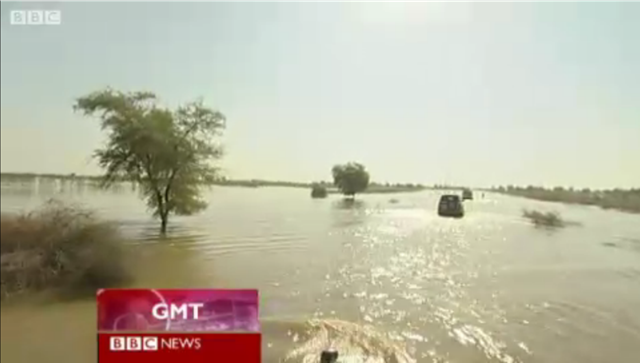Five million Pakistanis struggling in flooded Sindh province – ‘Ominous silence’ from international donors called ‘pathetic’
By Orla Guerin
17 October 2011 Sindh (BBC News) – Muhammad Hanif rarely let his youngest son Abid out of his sight. The poor farmer was devoted to the lively three-year-old: “I was always picking him up and playing with him. He was the baby of the family. I couldn’t be without him for five minutes,” he said. Now he is without him forever. Abid died from diarrhoea and gastroenteritis contracted from contaminated water. His parents had nothing else to give him. “We were drinking contaminated water and eating food washed in that water,” Muhammad told me. “After that he started vomiting. We took him to the doctor, but he didn’t improve.” Muhammad is keeping the truth from his older son Hamid – now a lonely five-year-old. “When he wakes he asks for Abid,” he said. “He asks again in the evening. I say ‘he’s gone to play, and he’ll be back soon’.” The stagnant flood water still surrounds him in Tharparkhar district, in southern Sindh. It is on both sides of the road where Muhammad and many others are living in crude shelters. Two months on, they don’t even have tents. Muhammad’s wretched settlement can only be reached by boat. In his area alone, there are 44 marooned villages. Parts of Sindh remain hostage to the floods. Our boat was carrying local men, returning from receiving aid at a United Nations World Food Programme distribution point. One of those going home with a month’s ration was Allah Batchayo, whose name means “Saved by God”. Once on dry land, he struggled under the weight of 30-kilo sacks of wheat flour and rice, but he is relieved to have supplies for his extended family of 15. Like many here, he said he could not rely on his own government for help. “It very clear that the ruling party gives preference to its own supporters when it comes to relief aid, “he said. That claim is borne out by local and international aid workers. One seasoned aid official told BBC News that ruling party politicians and local officials often tried to control where aid was distributed, favouring their chosen villages. “It happens a great deal,” he said, ” but that pressure is resisted.” The major problem for aid agencies, however, is that there is so little assistance to go around. The international response to the floods disaster has been sluggish at best. “Pathetic” was the verdict of one aid worker. The reaction from donors had been an “ominous silence”, according to the International Committee of Red Cross and Red Crescent Societies. Veteran aid worker David Wright, Pakistan Country Director with Save the Children, said it was the worst he had ever seen. “I’ve been in this game now for 15 years,” he said, “and I’ve never seen a response that has taken so long to get off the starting blocks. These people have lost their homes and their livelihoods. It’s bigger than the tsunami.” But the response is not. The United Nations says more than 5 million people are struggling to survive without adequate food, water, shelter or medical supplies – but its appeal for the victims is only 20% funded. That could mean that relief supplies dry up fast, said Robin Lodge, of the UN’s World Food Programme. “We’ve got enough for the next few weeks,” he told me. “After that no funding, no operation. We would have to stop and that would be catastrophic. We cannot invent resources.”
Pakistan’s Sindh province remains hostage to flood water
